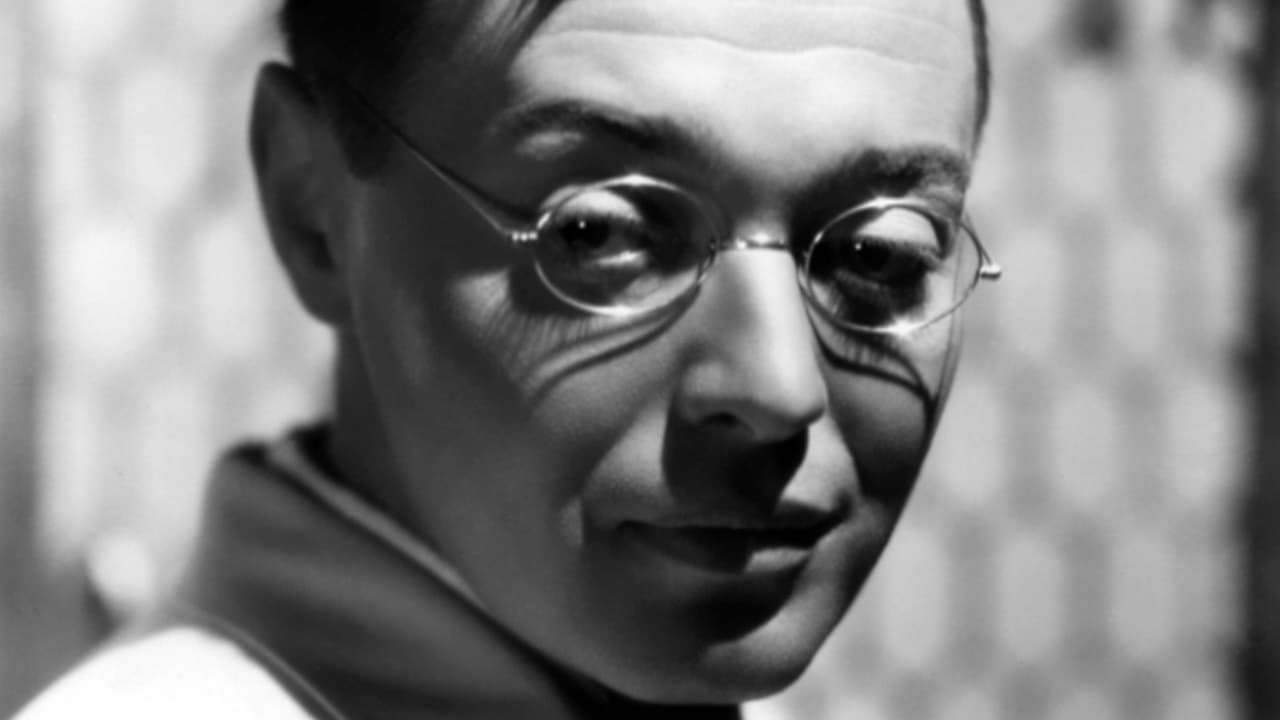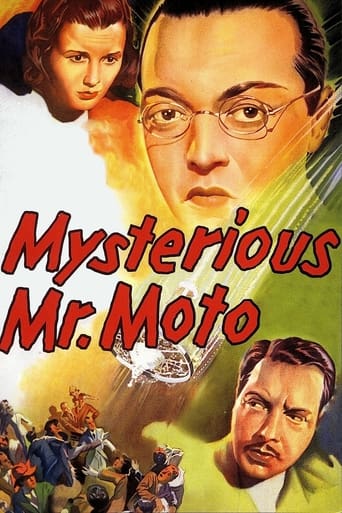

Mr. Moto (Peter Lorre) has himself imprisoned on Devil's Island so he can help his cellmate (Leon Ames) escape and thereby get the goods on a gang of international killers.Trying to determine where the racism begins, ends and is even refuted in the Mr. Moto pictures is a fun game. Certainly, Moto himself can be thought of as a racist invention because of his portrayal by white man. But then, he is portrayed as clever and likable, so it is not as though the creators meant to insult the Japanese.Further, the film actually shows men acting racist and presents them in a poor light. And a subtle jab is given to racism when Moto is able to easily get through a gate by merely being a house servant. Who is foolish here? On top of all this, we have a fairly decent detective story, a jail break, and a mighty impressive bar fight.
... View MoreWith this, I begin a seven-movie tribute to the late British film critic Leslie Halliwell (the first one I came across and who instilled in me a love for the golden age of cinema) on the 25th anniversary of his untimely passing. He had compiled two books citing 219(!) of his all-time favourites, including titles he did not even praise all that much in his assessment on the official pioneering guide! Even if hardly constituting products of outstanding merit, but certainly proving great fun to watch, he showed a particular fondness for crime/mystery franchises (such as the Mr. Moto one here, Charlie Chan, Bulldog Drummond, Sherlock Holmes and "The Thin Man") – and also threw in a couple that could only be described as "guilty pleasures" i.e. NIGHT MONSTER (1942) and HOUSE OF Dracula (1945)! This is actually the fifth entry in the character's original eight-movie run and, though I own all of them (as well as the 1965 one-off revival. THE RETURN OF MR. MOTO), only the second I have watched so far. Coincidentally, the other one (MR. MOTO'S LAST WARNING {1939}) was also singled out for praise by Halliwell in those volumes and, indeed, "Mr. Moto" is the only series to receive more than a single nod: make of that what you will! While there are obvious intrinsic similarities between him and that other even more popular Asian sleuth, Charlie Chan (concurrently the subject of a parallel franchise that would last much longer at the same studio – Fox), so much so that one of the Moto films i.e. MR. MOTO'S GAMBLE (1938) was originally planned as a Chan entry(!), the two detectives' modus operandi was decidedly different – since the former adopted affability and camouflage to solve any given case, whereas the latter relied on wise sayings and a little help from his brood of sons to get at the truth.Needless to say, the look of the films and some of their credentials were similarly interchangeable – but so was the entertainment value gleaned from them: the Motos' briefer stretch ensured that this (and the plot lines) did not risk running thin, as the Chans inevitably did – especially since it saw a couple of replacements to the central role along the way! To its credit, not all these various detective thriller series featured great actors in the lead – but this surely was the case with Mr. Moto, played for nearly two straight years by Austro-Hungarian Peter Lorre in the initial stages of his Hollywood career. Though his features could hardly pass for an Oriental, Lorre's diminutive stature and soft-spoken delivery made him an ideal choice regardless: still, he is not played up as a feeble and subservient stereotype (outside of a deliberate disguise on his part) – in fact, he can effortlessly outwit or physically overcome his antagonists and show authority figures for the pompous fools they are (as amply seen in the movie under review)!At this juncture, I cannot say which is the better effort of the two Motos I have checked out: it has been some time since my sole viewing of LAST WARNING, the sixth in the saga, via an original DVD of Public-Domain "Mystery" films (generously donated to me by an American friend of long standing) – though I would probably give the edge to it in view of supporting actors George Sanders and John Carradine and the exotic setting involved. Incidentally, why MYSTERIOUS was so called is itself a puzzle – as this is all-too-generic (witness the almost identically-titled yet wholly unrelated efforts involving the Oriental figure of Mr. Wong incarnated by fellow horror icons Bela Lugosi and Boris Karloff) and, basically, the kind of moniker by which a personage is normally introduced to audiences! That said, it is obviously representative of the lot, with respect to narrative (already with an eye on the impending war in Europe), twists (Moto springs a hit-man - Leon Ames - out of jail to catch his gang leader!), suspense (the climax being set in a crowded art gallery, with Moto dressed up as a disgruntled Germanic artist!), characterization (for the best part of the film, Moto poses as the hit-man's meek butler, bullied by racist bar patrons, in order to expose his opponents!), romance (Moto's own relationship with an Asian colleague working undercover is interesting – countering the obligatory one between the second leads - including Henry Wilcoxon) and comedy relief (supplied by Erik Rhodes, formerly the "other man" of many an Astaire/Rogers musical). In fact, the whole atmosphere (even more so here in view of the London backdrop and looking particularly nice in this DVD-sourced transfer) is – delightfully – not too far off the early Hitchcock mark.
... View MoreIn the late 1930s, eight Mr. Moto films were made of varying styles. In some (the best ones if you ask me), Moto was a rather amoral character and often killed bad guys instead of arresting them. In the lesser films, Moto was almost like a clone of Charlie Chan--very sedentary and the sort of guy who wouldn't hurt a fly. Well, this one is of the former type where Moto is a good guy but is more than willing to rub out his enemies to save the government the trouble of prosecuting them! What a guy, that Moto! The film begins with Moto escaping with a prisoner from Devil's Island (Leon Ames). It seems that Moto is so intent on infiltrating a gang of international assassins that he went to a heck of a lot of trouble to get himself locked up, befriending one of the founding members of the group and then helping him escape! Back in London, Moto pretends to be an ignorant and VERY stereotypical Japanese houseboy for Ames. Many, I'm sure, will be annoyed or shocked with Peter Lorre's performance in this dual role, as the houseboy (and escaped prisoner) is 100% stereotype--complete with phrases such as "so solly"! Uggh. Well, while I don't condone this, this was the 1930s and have learned to ignore these scenes--otherwise all the Moto films will make you go crazy! Moto's job is not just to discover who's the head of this mob and capture the entire gang, but he must also somehow protect a Czechoslovakian guy who is really, really stupid. First, he sounded about as Czechoslovakian as Winston Churchill. Second, he never takes the assassins' threats very seriously--even when they showed they really meant business. Even after they kill one of his friends right after they promise to demonstrate their power, this idiot insists he needs no help from Moto or the police!! Can anyone be that stupid? Apparently, in a B-film the answer is "yes".So far, this film is about average for a Moto film. However, towards the end it really picks up its pace and delivers a very shocking finale that only Moto could engineer. See it for yourself and see what I mean. Oh, that Moto! Overall, a bit better than average for the series despite having a really dumb character (if I were Moto, I would have let him die) and Lorre's rather obnoxious impersonation of a brain-dead Japanese servant.
... View MoreThis was my first look ever at Peter Lorre's "Mr. Moto" character, and I couldn't help but compare and contrast him to the famous "Charlie Chan" of a similar period. "Mr. Moto" is charming but isn't the comedian or the proverb-quoting Chan. I would have to watch a few more Moto movies before I could really compare the two fairly, as for quality and entertainment value, but what I saw in this film impressed me. My guess is that both of them are winners. I'm anxious to watch another Mr. Motor adventure, after seeing this.I think both characters did a lot - or at least I hope they did - to put Asians in a favorable light. Hey, Chan and Moto are the heroes in their movies, and the smart and courageous guys who solve the murders. These series had to be a boost to the Asian-American community.In this story, Moto pretends to be a fugitive from Devil's Island, one of two escapees who wind up in London. That was the idea all along for Our Man as he hoped his fellow man-of- flight, "Paul Brissac" would lead to him to bigger fish in the criminal world, specifically "The League of Assassins." Just when I thought this film was starting to get a tiny bit slow, it picked up nicely and had very good last 20-some minutes with a suspenseful ending. The actions were hokey but so what? The film is 70 years old so I don't expect state-of-the-art special-effects. In spots, it was so corny it made it fun. I was shocked how physical little Mr. Moto was, throwing bodies around like a WWF bruiser!Two quality actors, in addition to Lorre, had key roles in here: Leon Ames ("Brissac") and Henry Wilcoxon ("Darvak"). There's some good direction in here, too, by Norman Foster, who not only directed some Mr. Moto films, but a few Charlie Chan movies, too. He also married Claudette Colbert.In addition, the restoration job on the DVD transfer makes this a good-looking film.
... View More